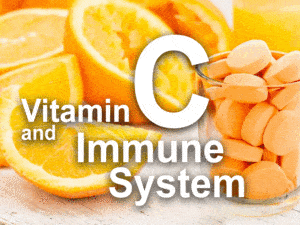
Immune system is defined as complex network of cells, tissues, organs, and substances that helps the body fights infections caused by a range of pathogen, such as bacteria, viruses, fungi and parasites. Development of a good immune system is essential and requires a healthy diet and lifestyle. One of the micronutrients that have been long associated with strong immune system is vitamin C.
Vitamin C, also known as ascorbic acid, can be easily obtained from consumption of citrus fruits, such as oranges and orange juice, peppers, strawberries, blackcurrants, broccoli, brussels sprouts and potatoes.1 Vitamin C is one of the essential vitamins – vitamins that cannot be synthesized by human. It has multiple roles in our body systems which include:
- Boosting immune system
- Helps in collagen formation
- Helps to maintain capillaries, bones and teeth
- Aids in the absorption of iron
- Act as antioxidant
- Helps in wound healing.
Lack of vitamin C may lead to poor wound healing, weakened collagenous structure and impaired immunity.2 Individuals with vitamin C deficiencies are more vulnerable to more severe infections.3
Vitamin C acts as a support for various cell functions of both innate and adaptive immune system. One of the functions is to promote anti-oxidant activity of skin, resulted in prevention of oxidative stress induced by environmental pollutants. Through collagen formation, vitamin C is also responsible for development of healthy skin which act as the first barrier against any external pathogen. Its role in wound healing also play a vital function in preventing infection from entering the body.
Vitamin C was reported to accumulate in phagocytic cells, such as neutrophils which will assist in process of engulfing microbes. Furthermore, vitamin C also helps in automated cell death process which will clear used neutrophils from the site of infection. This will result in decreasing necrosis and potential tissue damage.
Sufficient vitamin C is essential for each one of us as it is one of important micronutrients that our body needs to ensure good health. A healthy diet with fruits and vegetables rich with vitamin C is sufficient for required vitamin C intake. For individuals with vitamin C deficiency, supplement intake may help to improve the vitamin C level.
References:
- Recommended Nutrients Intakes for Malaysia, A Report of the Technical Working Group on Nutritional Guidelines, MOH, 2017
- Carr AC & Maggini S. Nutrients. 2017 Nov; 9(11): 1211.
- Hemilä H. Nutrients. 2017 Mar 29;9(4):339


1 Comment
This article is well-researched and informative. For further exploration, click here to access additional resources.